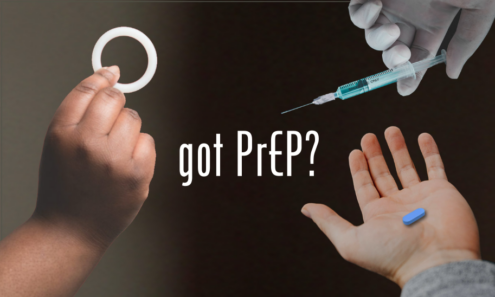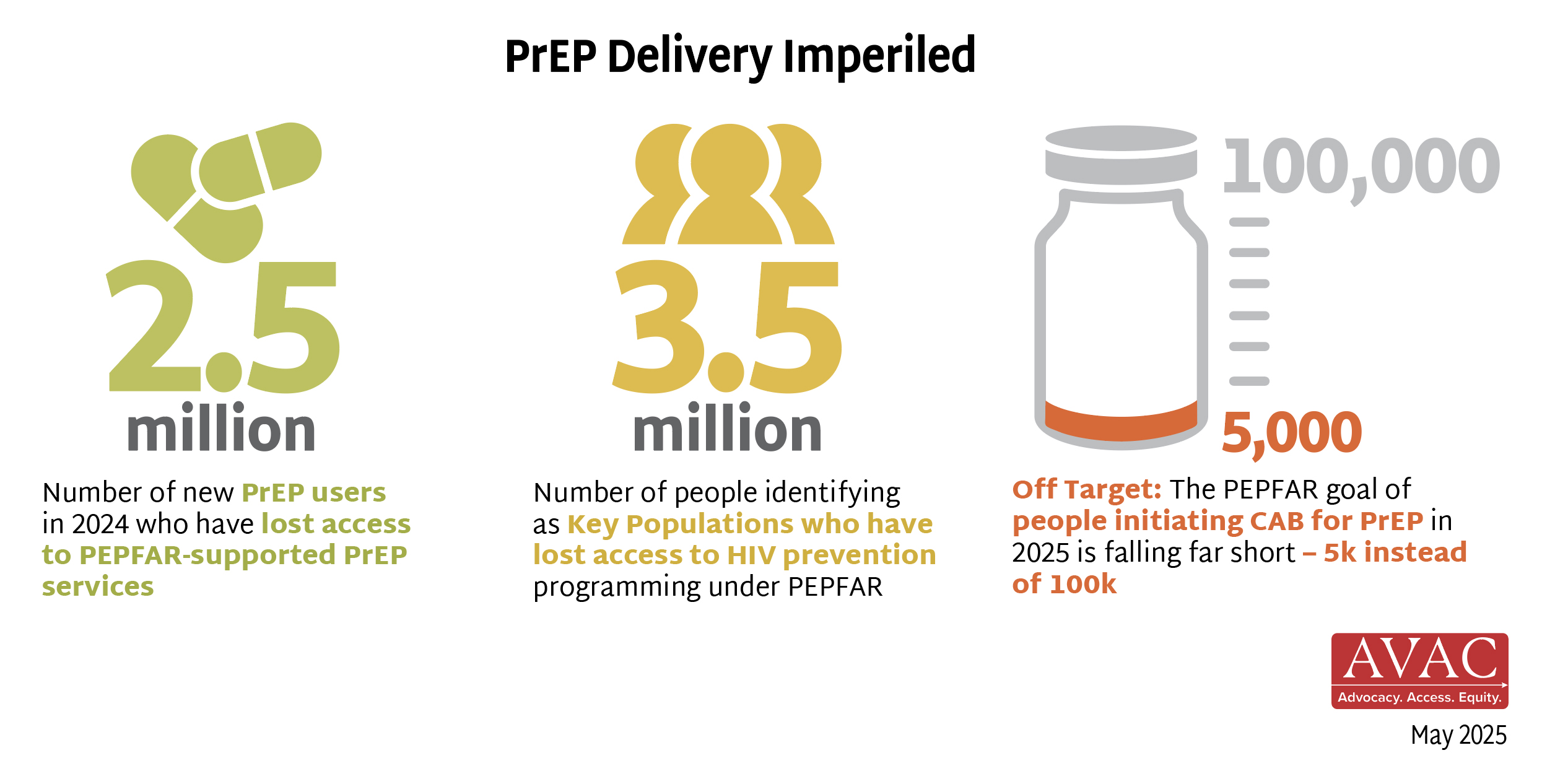Impact of PEPFAR Stop Work Orders on PrEP
Last updated October 15, 2025
The widespread termination of US government contracts and PEPFAR stop work orders have had a devastating impact on access to HIV prevention. To find out more about what happened and understand the ongoing impacts in detail, see below.
Click here for a downloadable slide deck summarizing the information on these pages.
Learn More
- Overview: PrEP Service Status Map / What Just Happened? / Key Impact Areas to Date / Now What?
- Regional Impacts: Africa / Asia / Eastern Europe & Central Asia / Latin America & Caribbean
- New Product Introduction: Cabotegravir Rollout / CATALYST Study / Planning for LEN
What Just Happened?
- January 20: US President issued an executive order calling for a 90-day freeze on foreign aid
- January 27: Stop work orders issued on all USAID-funded grants, halting significant proportion of HIV prevention research and delivery across the world
- February 1: Limited waiver announced for PEPFAR activities, though it does not cover any HIV prevention activities outside of vertical transmission
- February 26-28: Despite waiver and a judicial temporary restraining order against the freeze, the vast majority of USAID-funded programs received terminations; confusion remains
- March 25: Congress fails to reauthorise PEPFAR
Impact to date has already been significant, as quantified in the PEPFAR Impact Tracker and documented by PEPFAR Watch, amfAR, the HIV Modelling Consortium, and Global Black Gay Men Connect.
Key Impact Areas to Date
As of May 2025
|
|
PrEP Delivery Service Disruptions: While some countries have suspended PrEP services almost completely; others have reduced; and some still have good service. See below for map. |
|
|
Product Introduction Stalled: PEFPAR’s goal had been to initiate 100,000 users across ten African countries on CAB by end of 2025. By Oct 2024 end, they had initiated 5,000 users across four countries, and in Jan 2025, procurement for 2025 was paused. |
|
|
Research Studies Suspended: Projects studying CAB and DVR serving over 11,000 participants have been terminated, and other projects were temporarily suspended. |
|
|
Healthcare Workers Forced to Pause Work: Initially, in Kenya, 17% of total nurses (22,000) and 12,000 ancillary staff stopped work; while in Zambia and Malawi numbers rose to 20% (17,000) and 43% (4,500) of nurses, respectively; Malawi has since used domestic funding to hire 6,000 healthcare workers, and 50% of healthcare staff have returned to work in Kenya. |
|
|
Key Populations Struggle with Access: Many delivery sites catering to KPs have closed, and governments fear blacklisting from future US government funding if they engage in KP-supportive work. |
|
|
System-level Impacts are Being Felt: This includes the cessation of health system strengthening projects in Kenya, shuttering of health MIS systems in Malawi, and disruption to the development of long-acting PrEP guidelines in Uganda. |
|
|
Key Mitigation Strategies: Most countries are seeking alternative funding sources (Global Fund, government financing) and integrating service delivery (comprehensive care clinics and key population services) into public health systems. |
The impact of PEPFAR stop work orders on HIV prevention outcomes is expected to be severe.
- If PEPFAR is not reauthorized and no other resrouces fill the gap, “there would be a 400% increase in AIDS deaths, amounting to 6.3 million deaths.” — UNAIDS
- Without funding for prevention programs in Africa, over the next years, incidence rates amongst adults could triple and vertical transmission is likely to double. — HIV Modelling Consortium
- “Organizations that deliver HIV services not covered by the [PEPFAR] waiver, such as those primarily implementing prevention services…, are especially unlikely to survive the 90-day freeze… The national and global HIV response will fall back from these hard-fought gains and create the environment for HIV to re-surge.” — amfAR
- 84% of 65 implementing partners reported disruption to PrEP service delivery following the stop work order. — PEPFAR Watch
- In Nigeria, Kenya, and Uganda alone, an estimated 2.2 million people lost access to HIV prevention services. – GBGMC
Now What?
Key issues to consider to ensure continued availability of PrEP and to adapt to a significantly changed PEPFAR prevention progam:
- Preserve existing oral PrEP programmatic platforms
- Re-start/sustain CAB and DVR introduction activities to operationalize PrEP choice
- Increase Global Fund investments in PrEP
- Plan for LEN introduction – ensuring that the PEPFAR/Global Fund ambitious announcement in December 2024 can still be operationalized
- Enhanced role for the private sector and innovative delivery models
Further Resources
- PrEPWatch.org — data, information, and PrEP resources
- Global PrEP Tracker — tracking PrEP initiations by country over time
- Study Tracker — tracking research relating to new PrEP options
- UNAIDS Monthly HIV Services Tracking Platform– monthly data on people reached with HIV services from former PEPFAR-partner countries

If you have any additional information or insights to share, please contact [email protected].
